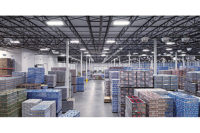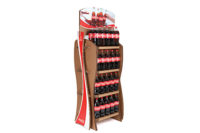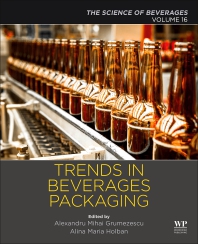
Weinstein Beverage Co.’s 60,000-square-foot office and warehouse building in Wenatchee, Wash., has become the embodiment of the company’s new direction since the building opened in 2009, says Pat Weinstein, owner and chief executive officer of the family-owned Pepsi and Dr Pepper Snapple Group (DPS) franchisee. The building was custom built by Weinstein Beverage and provides the company with the flexibility needed for its growing business, which employs as many as 120 people depending on the season.
The majority of Weinstein Beverage’s business focuses on sales, distribution and merchandising of Pepsi, DPS, Monster Energy and additional brands across its three branches in Wenatchee, Omak and Moses Lake. Alongside cases of carbonated soft drinks, energy drinks and still beverages, the 38,000-square-foot warehouse also stores various products that are sold through the soft drink distributor’s auxiliary businesses, such as paper products, janitorial supplies, vending machines and wine, which is stored in a segregated area.
The company is a member of the cooperative that owns regional Pepsi and DPS bottler Pacific Northwest Beverages LLC. Pacific Northwest Beverages is co-owned by 17 Pepsi bottlers, including Pepsi Bottling Group, and supplies beverages to a network of bottlers in Washington, Oregon, Idaho, Alaska and one market in northern California. Weinstein Beverage receives products from the co-op’s production facilities in Tumwater, Wash.; Mount Angel, Ore.; and three facilities in the Seattle area, Weinstein says.
The company’s Wenatchee warehouse provides the company with room to grow, Weinstein says. The warehouse features vertical racks that take advantage of the warehouse’s 38 foot ceiling and provides the capacity for an additional hundreds of thousands of cases, he says. Currently, the company distributes 200,000 to 300,000 cases a week and its inventory turns over three times a month, he says.
“The capacity in the warehouse is not as nearly as full as it could be, and we have additional room on this property that we could continue to expand when necessary,” Weinstein says.
The warehouse stores the company’s beverage inventory, which includes Pepsi, Dr Pepper, Snapple and Monster products as well as smaller brands, such as FRS Healthy Energy and Talking Rain. Weinstein Beverage also offers the co-op’s Crystal Cascade brand of bottled water, which is part of the company’s aim to provide the best service to customers, Weinstein says.
“We have lots of different products, which is part of our aim to dominate our market,” he says. “We offer four to five price points of bottled water and a selection of brands that provide enough differentiation in a category. Our inventory even includes toilet paper.”
The warehouse space also houses the inventory and equipment for Weinstein Beverage’s four auxiliary businesses, including Eastern Cascades Vending, a coffee kiosk and supply company, wholesale goods distributor and wine distribution company. The goods for the auxiliary businesses, which include janitorial supplies, disposable coffee cups and snack foods, are stocked in their own dedicated areas of the warehouse.
The vending company has a separate space for its stock of beverages, snack foods and frozen foods. Eastern Cascades Vending receives its products and pricing for its vending business from national supplier Canteen Vending Co. Weinstein Beverage’s vending company also operates the coffee kiosk and supply company. The Wenatchee warehouse also has an area for the service and repair of its vending and fountain equipment.
The company’s most recent addition, the wine distribution company Wein & Stein LLC has its own dedicated portion of the warehouse for inventory of the wine brands it distributes to local retailers and restaurants. The wine distribution company opened in 2009 and is mandated by the state liquor control board to have a secure location isolated from the remainder of the warehouse, Weinstein says. In addition, the products must legally be distributed separately from soft drinks, which is a mandate that Weinstein says he is working to revise. In Washington, beer and wine distributors are able to deliver soft drinks, but not vice versa, Weinstein says.
Scheduled for efficiency
Weinstein Beverage has between two-thirds and three-quarters share in a market that is dominated by many independently owned retailers as well as chain retailers, such as Wal-Mart and Safeway. The company benefits from its family ownership and strong relationships with its customers to continue to dominate the marketplace.
This year, Weinstein Beverage added Dan Crets, a 30-year veteran of the Pepsi system, as its general manager and chief operating officer. As part of his re-evaluation of the business, Crets introduced 10-hour, four days a week scheduling for the drivers, sales and merchandising representatives in the soft drink business. The new scheduling, four-10’s as Crets calls it, provides six days of delivery and merchandise services as the team is spread across four day schedules ranging from Monday through Thursday, Tuesday through Friday or Wednesday through Saturday.
“I’ve actually expanded the delivery coverage without adding resources by spreading out the day with four-10’s and spreading out the work week,” Crets says. “We’ve been able to improve delivery and service and it has assisted our merchandising support by not having to dig through pallets all week. It’s actually been well-received by our stores and that was the most important thing for me, making sure our customers felt good about it.”
The Wenatchee warehouse personnel primarily use walkie lift trucks to assemble orders based on pick sheets. The company’s entire inventory of products is initially received by the Wenatchee warehouse and then shipped to its warehouses in Omak and Moses Lake. Recently, Weinstein Beverage has examined its routes and has the ultimate goal of maintaining one inventory company-wide, Crets says.
In the next year, Weinstein Beverage is planning to remove inventory from its Moses Lake warehouse. The company plans to receive products, load orders for Moses Lake customers and deliver pre-loaded trailers for distribution by Moses Lake personnel, Crets says.
Although Wenatchee and Moses Lake have a similar amount of volume, the removal of inventory in Moses Lake better leverages the Wenatchee warehouse, Crets says.
“We’re going straight to customers out of here, so we’ll spread our reach,” he says. “We won’t pass up customers going to Moses Lake because we’ll start delivering those from here as well.”
In addition to changing its packaging mix to offer more PET packages, Weinstein Beverage also is studying some of its smaller brands during the SKU rationalization process.
“We’re going to have to try and figure out, do they fit?” Crets says. “I want us to consider, first, is the distribution in place? If the distribution is in place, is the margin and volume worth keeping them in our warehouse when a very tight number of SKUs is critical, especially when there’s wholesale goods as well.”
As it focuses on maximizing the efficiency of the Wenatchee warehouse, the company also plans to implement the 10-hour, 4 days a week schedule for its vending personnel this year. Weinstein Beverage also continues to improve its loading efficiency. Occasionally as customers overlap, orders are shipped on the same truck, but the company is working to identify the most efficient way to deliver its various goods. The first step is Crets’ intention to separate the delivery of vending and wholesale goods.
“We’re going to segregate some of that work out so that we can focus on vending,” Crets says. “The wholesale customers are not the same customers typically as vending and several other customers. They may mirror each other, but it’s not enough to enjoy much efficiency from that. … The day is only so long and my fear is that we’re not focused enough on filling our vendors as well.” BI
Sidebar: Thoughtfully designed
Weinstein Beverage’s former facility in Wenatchee was plagued by uneven floors, repurposed spaces and aesthetic unpleasantness, says Susan Landon Weinstein, co-owner of Weinstein Beverage. After 62 years in the building, the soft drink distributor purchased land on the outskirts of Wenatchee in 2008 and set out to build its ideal warehouse and office space.
However, the design did not come easily. Weinstein Beverage went through two architects in the process of designing and building the 60,000-square-foot office and warehouse space. Due to complications, the space was ultimately designed by Landon Weinstein, who frequently traced sketches of the plan for the warehouse’s exterior, landscaping and office design on airplane napkins placed over scaled drawings.
She was careful to ensure that the design best used the interior space for every level of the company’s personnel. The building’s office space takes advantage of the facility’s prime views of the surrounding mountains, Columbia River and valley, which can be seen from virtually any desk or workspace in the office as well as from the windowed break and conference rooms.
For the exterior of the building, Landon Weinstein chose a color scheme that mimics the often buff-colored surrounding hills of the irrigated desert environment, she says. The building’s exterior paneling was installed in an abstract version of the hills as well. The design also keeps the branding of the soft drink business clear with a theme of carbonation carried throughout the design - from giant bubbles incised in the exterior stucco, interlocking circular pads leading to the entryway and discreet circular patterns in the conference room’s carpeting, she says.
When designing the space, Landon Weinstein also spoke with each employee about their daily routine, how they worked within their space and with whom they coordinated. The office’s traffic patterns were designed to create or avoid contact with particular personnel. For instance, the areas allow drivers to relay information from the field to Weinstein Beverage’s sales force, while protecting office staff possibly distracting conversations, Landon Weinstein says.
“Many of these details look like small things, but I wanted the space to function,” she says. “Employees who are happy in their environments are more efficient as well as more pleasant to work with.”
Her attention to detail is reflected in coat hooks placed inside the doors of the warehouse for wintery days and the design of the reception area. While maintaining privacy to staff, the reception area features windows through to the inner offices so the area is visible to more than one person, she says. BI




